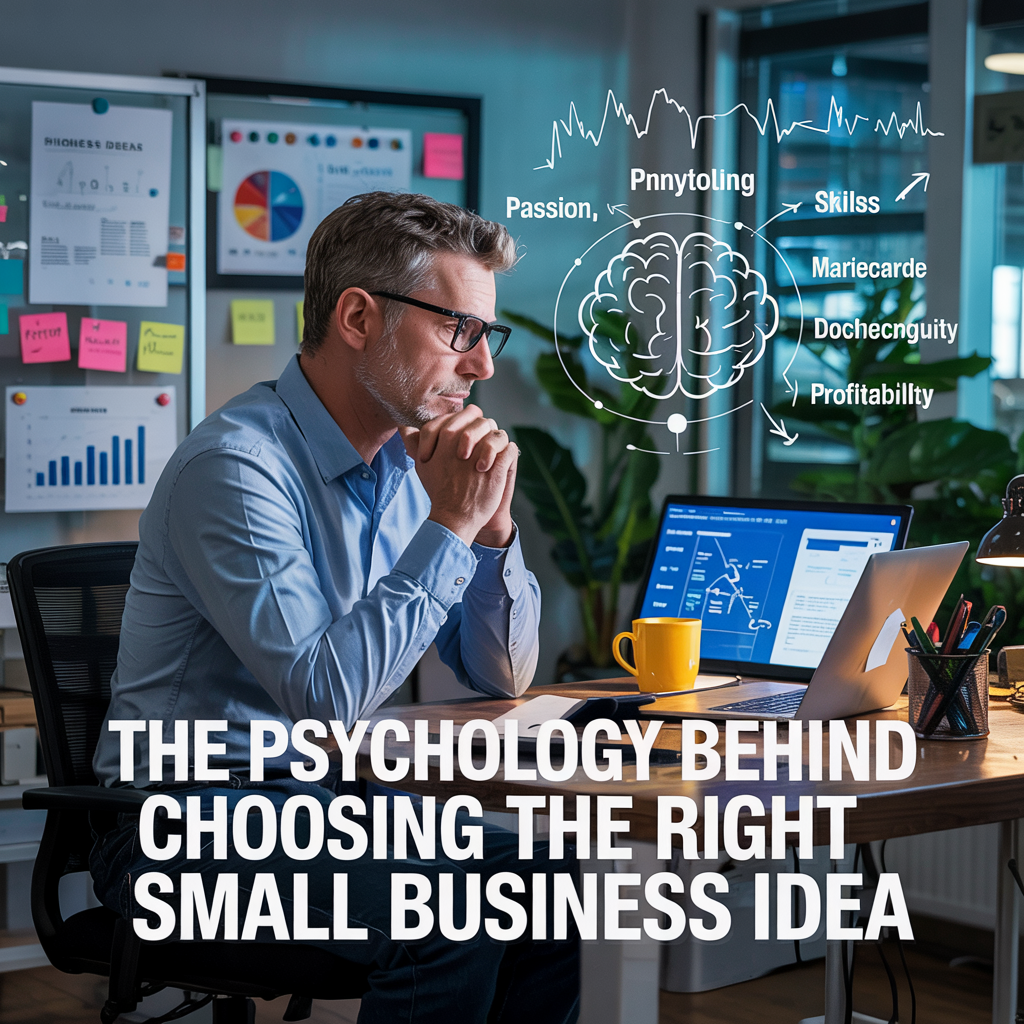The Psychology Behind Choosing the Right Small Business Idea
Choosing a Small Business Idea begins with understanding yourself first, then the market second.
Many people rush into business ownership without considering how their personal psychology affects their chances of success.
The right business idea feels like wearing a perfectly tailored suit – comfortable, confidence-boosting, and designed specifically for you.
When founders select ventures that align with their core values and natural strengths, they experience greater satisfaction and resilience during inevitable challenges.
This deep alignment between person and business concept creates a powerful foundation that can weather economic storms and competitive pressures.
Successful entrepreneurs recognize that the business they choose becomes their daily reality for years, possibly decades, shaping their lifestyle and relationships.
Your psychology – including your personality traits, thinking patterns, motivations, and emotional tendencies – acts as the hidden architecture behind every business decision.
This comprehensive guide explores how understanding your psychological makeup can dramatically improve your process of choosing a small business idea that brings both profit and fulfillment.
We strongly recommend that you check out our guide on how to take advantage of AI in today’s passive income economy.
Table of Contents
Understanding Your Entrepreneurial Psychology
The Founder-Business Fit Theory
The concept of founder-business fit suggests that your personality should match your enterprise’s demands for optimal performance.
This psychological alignment creates a natural advantage where work feels energizing rather than depleting, even during intensive periods.
Research consistently shows that entrepreneurs who select business ideas aligned with their psychological strengths report higher satisfaction and demonstrate greater persistence.
The entrepreneurial mindset thrives when there’s congruence between your natural tendencies and your business activities.
For example, highly extroverted individuals often flourish in relationship-driven businesses like consulting or sales, drawing energy from client interactions.
Conversely, those with analytical personalities might find greater satisfaction in data-driven enterprises where systematic thinking creates competitive advantage.
Choosing a small business idea without considering this psychological fit often leads to founder burnout and business failure.
Your business becomes an extension of yourself, so alignment between your authentic self and your venture creates sustainable motivation.
Psychological Drivers Behind Business Selection
Understanding what truly motivates you provides crucial insight when choosing a small business idea that will sustain your interest.
Some entrepreneurs are primarily driven by achievement and recognition, naturally gravitating toward high-growth, innovative business models.
Others find deeper satisfaction in mastery and craftsmanship, preferring businesses where they can continuously perfect skills and create exceptional quality.
Security-motivated individuals often select stable, proven business models with predictable income patterns rather than speculative ventures.
Those driven by impact and meaning might prioritize social enterprises where profit and purpose intertwine to address meaningful problems.
Autonomy-seekers value the freedom to control their schedule and decisions, making independence a non-negotiable aspect of business decision-making.
Understanding your core psychological drivers helps narrow the field when choosing a small business idea worth pursuing.
These motivations often operate below conscious awareness until you deliberately examine what energizes and fulfills you.
The Four Psychological Pillars of Small Business Selection
Your Cognitive Style and Business Compatibility
Each person processes information and makes decisions differently, creating natural affinities for certain business types.
When choosing a small business idea, consider whether your thinking style is more analytical or intuitive, as this affects which business environments feel natural.
Analytical thinkers often excel in businesses requiring systematic problem-solving, detailed planning, and logical optimization.
Their methodical approach creates advantages in technical fields, financial services, or any business requiring precise execution.
Intuitive thinkers frequently thrive in creative enterprises, strategic consulting, or innovation-driven businesses where pattern recognition creates value.
Their ability to connect seemingly unrelated concepts and envision possibilities makes them natural disruptors and trend-spotters.
The process of choosing a small business idea should incorporate an honest assessment of how your mind naturally works.
Business models that leverage your cognitive strengths reduce friction and frustration in daily operations.
Emotional Intelligence and Customer-Facing Businesses
Your emotional intelligence significantly impacts your suitability for businesses requiring high customer interaction.
When choosing a small business idea, assess your ability to read emotions, manage difficult conversations, and maintain composure under pressure.
Businesses in counseling, coaching, healthcare, hospitality, and high-end sales all demand superior emotional regulation and interpersonal awareness.
Entrepreneurs with high emotional intelligence often find satisfaction in these fields, drawing energy from emotional connections rather than feeling drained.
Those with average emotional intelligence might prefer businesses with more limited client interaction or might partner with someone stronger in this area.
The founder psychology behind successful customer service businesses almost always includes genuine interest in understanding and helping others.
Choosing a small business idea in highly emotional industries without this orientation often leads to stress and diminished business performance.
Your capacity for empathy becomes a business asset or liability depending on your chosen industry.
Risk Tolerance and Business Model Selection
Your psychological relationship with uncertainty directly influences which business models feel comfortable versus anxiety-producing.
The startup alignment between your risk profile and business model represents one of the most critical psychological factors in entrepreneurial success.
Risk-averse individuals typically prefer established business models with proven revenue mechanisms and predictable cash flow patterns.
Franchises, professional services firms, and local retail businesses often appeal to entrepreneurs seeking more certainty.
Those with higher risk tolerance may gravitate toward innovative startups, disruptive technologies, or markets with greater volatility and potential upside.
Choosing a small business idea without considering your risk comfort zone frequently leads to decision paralysis or excessive stress.
Your psychological ability to handle uncertainty without becoming overwhelmed represents a genuine business constraint worth respecting.
Understanding your authentic risk tolerance helps you design appropriate safeguards when venturing beyond your comfort zone.
Personal Strengths Assessment for Business Selection
Choosing a small business idea that leverages your existing strengths creates immediate competitive advantage through natural competence.
Conducting a thorough personal strengths assessment reveals capabilities you might take for granted but that provide business value.
These strengths encompass hard skills like technical abilities and soft skills like leadership, communication, and relationship-building.
Consider which activities consistently produce a state of flow where time passes quickly and work feels energizing rather than depleting.
Research confirms that businesses built on founder strengths reach profitability faster than those requiring extensive new skill development.
Your personal strengths create the foundation for authentic business differentiation in crowded markets.
The best small business ideas often emerge at the intersection of your strengths, market opportunity, and personal passion.
Identifying transferable strengths from previous experiences helps broaden your options when choosing a small business idea.
Psychological Traps in the Selection Process
Overcoming Confirmation Bias When Evaluating Ideas
Confirmation bias—the tendency to favor information confirming existing beliefs—creates significant blindspots when choosing a small business idea.
This psychological trap leads potential founders to overvalue positive signals while dismissing critical warnings about their preferred concept.
Entrepreneurs can combat this bias by deliberately seeking disconfirming evidence and alternative perspectives on their business concept.
Creating specific criteria for evaluation before reviewing business ideas helps maintain objectivity during the selection process.
Inviting structured feedback from diverse sources, especially those with relevant industry experience, counterbalances personal blind spots.
The founder psychology that produces successful businesses includes intellectual humility and genuine curiosity about potential weaknesses.
When choosing a small business idea, those who thoroughly investigate why their concept might fail often build more resilient models.
Decision quality improves dramatically when entrepreneurs consciously work to recognize and mitigate their confirmation bias.
The Sunk Cost Fallacy in Business Exploration
Many entrepreneurs struggle to abandon business ideas after investing significant time or resources, even when evidence suggests pivoting.
This psychological attachment to past investments—the sunk cost fallacy—can prevent entrepreneurs from choosing a small business idea with better prospects.
Business decision-making improves when founders evaluate opportunities based on future potential rather than previously invested resources.
Establishing clear milestones and decision points before beginning idea exploration helps maintain objectivity throughout the process.
The most successful entrepreneurs develop psychological comfort with pivoting or abandoning ideas that show poor market fit.
Choosing a small business idea becomes clearer when you separate emotional attachment from rational assessment of opportunity.
This detachment doesn’t mean abandoning passion, but rather ensuring that passion doesn’t blind you to market realities.
Developing the psychological skill of letting go gracefully prevents wasting years on fundamentally flawed business concepts.
Status Anxiety and Impression-Driven Choices
Social pressure and status considerations often unconsciously influence the process of choosing a small business idea.
Many aspiring entrepreneurs gravitate toward trendy industries that impress others rather than businesses that genuinely fit their skills and interests.
The psychological need for validation can override practical considerations about business viability and personal compatibility.
Tech startups, luxury brands, and creative agencies often attract founders partly motivated by the perceived status these businesses confer.
True entrepreneurial satisfaction typically comes from businesses aligned with personal values rather than external impressions.
Choosing a small business idea based primarily on how others will perceive it frequently leads to misalignment and diminished founder motivation.
The most sustainable businesses emerge when founders care more deeply about their product or service than about the impression it creates.
Self-awareness about status motivations helps entrepreneurs distinguish between genuine interest and social validation seeking.
Aligning Business Ideas with Life Goals
Lifestyle Design Through Business Selection
Choosing a small business idea represents one of life’s most significant lifestyle design decisions.
Different business models create dramatically different daily experiences, income patterns, and work-life boundaries.
E-commerce and digital product businesses often offer location independence and scalable income but require technical sophistication.
Service-based businesses typically provide faster initial revenue but create time-for-money constraints that limit scalability.
Brick-and-mortar establishments anchor entrepreneurs to specific locations while creating community and physical presence.
Thoughtful entrepreneurs consider not just the business outcome but the daily experience the business will create.
The psychology behind successful business selection includes realistic visualization of routine operations, not just launch and success.
Choosing a small business idea that aligns with your desired lifestyle prevents the common entrepreneurial trap of creating a prison of your own making.
Values Congruence and Sustainable Motivation
Businesses aligned with your core values create natural motivation that sustains effort through inevitable challenges and setbacks.
When choosing a small business idea, consider how the business model either reinforces or conflicts with your fundamental beliefs.
Values misalignment creates psychological friction that gradually erodes commitment and enthusiasm over time.
For example, those valuing environmental sustainability might experience constant cognitive dissonance in businesses with significant ecological impacts.
The entrepreneurial mindset thrives when business activities feel meaningful rather than merely profitable.
This values congruence creates resilience during difficult periods when financial rewards alone might not justify continued effort.
Choosing a small business idea with strong values alignment also attracts team members and customers who share your fundamental orientation.
This shared values foundation creates natural community and support systems that enhance both business performance and personal fulfillment.
Balancing Passion and Practicality
The most sustainable businesses balance genuine founder interest with practical market opportunity.
When choosing a small business idea, entrepreneurs must navigate between following blind passion and pursuing soulless opportunity.
Pure passion projects often lack market viability, while opportunistic ventures without personal meaning frequently lose motivation.
The sweet spot combines sufficient founder enthusiasm with genuine market demand and appropriate profit potential.
Consider your relationship with the business content—whether you find the subject matter, customers, and operations intrinsically interesting.
Business decision-making improves when you honestly assess whether your interest will sustain through years of intensive focus.
Choosing a small business idea requires distinguishing between fleeting excitement and deeper, more durable forms of engagement.
The most successful entrepreneurs find business domains that continue to fascinate them even after the initial novelty fades.
Practical Psychological Frameworks for Decision-Making
The Ikigai Method for Business Selection
The Japanese concept of Ikigai offers a powerful framework for choosing a small business idea with holistic alignment.
This approach identifies businesses at the intersection of what you love, what you’re good at, what the world needs, and what people will pay for.
Complete alignment across these four domains creates businesses that provide both material success and psychological fulfillment.
Entrepreneurs can use this framework to evaluate potential business ideas against these essential criteria.
The Ikigai approach helps prevent common pitfalls like pursuing unprofitable passions or lucrative but unfulfilling opportunities.
Choosing a small business idea through this lens ensures consideration of both internal satisfaction and external market factors.
The founder psychology behind successful ventures almost always includes this balance between personal meaning and market reality.
Businesses that meet all four Ikigai criteria typically generate sustained motivation through both intrinsic and extrinsic rewards.
The Regret Minimization Framework
Jeff Bezos famously used regret minimization when choosing to start Amazon, imagining how he’d feel at age 80 looking back.
This psychological framework shifts perspective from immediate fears to longer-term life satisfaction when choosing a small business idea.
Entrepreneurs can apply this approach by imagining themselves in the distant future reflecting on various business paths not taken.
Which potential business would create more regret if not attempted, regardless of the outcome?
This framework often reveals deeper values and priorities that might remain hidden during conventional pro/con analysis.
Choosing a small business idea becomes clearer when viewed through the lens of potential future regret versus present fear.
The startup alignment between business choice and long-term life narrative creates powerful motivation during difficult periods.
This perspective helps entrepreneurs distinguish between anxiety-driven hesitation and legitimate concerns about business viability.
The Personal Board of Directors Exercise
Creating an imaginary personal board of directors provides psychological distance and diverse perspectives when evaluating options.
When choosing a small business idea, identify several mentors, role models, or trusted advisors whose judgment you respect.
Mentally consult this board about potential business ideas, imagining their questions, concerns, and recommendations.
This psychological exercise helps entrepreneurs access different thinking styles and expertise areas during decision-making.
The technique works by activating different mental models and reducing the limitations of your default thinking patterns.
Choosing a small business idea improves when you can temporarily adopt the perspective of others with relevant wisdom.
Your “board members” might include successful entrepreneurs, industry experts, financial advisors, and those who know you well.
This approach combines the benefits of external feedback with the efficiency of internal reflection.
Psychological Resilience for the Entrepreneurial Journey
Building Adaptability Into Your Business Identity
Psychological resilience requires maintaining core identity while adapting business approach based on market feedback.
When choosing a small business idea, consider building flexibility into your business identity from the beginning.
This adaptability allows pivoting without experiencing psychological crisis when initial concepts require significant modification.
Entrepreneurs who define themselves by solving specific problems rather than using particular methods maintain greater resilience.
For example, identifying as “helping people improve their fitness” creates more flexibility than “owning a specific type of gym.”
Choosing a small business idea with built-in adaptation pathways creates psychological safety during inevitable market shifts.
The entrepreneurial mindset thrives on this balance between committed direction and flexible implementation.
Psychologically resilient founders distinguish between abandoning goals and adjusting strategies to achieve those goals.
Developing Comfort with Uncertainty
The entrepreneurial journey inherently involves significant uncertainty that cannot be eliminated through planning alone.
When choosing a small business idea, assess your current relationship with ambiguity and your capacity to function effectively despite it.
Entrepreneurs with lower uncertainty tolerance often benefit from businesses with more predictable models and established precedents.
Those comfortable with uncertainty can explore more innovative concepts where the path forward emerges through experimentation.
Psychological preparation for entrepreneurship includes developing specific uncertainty management practices like focusing on controllable factors.
Choosing a small business idea appropriate to your uncertainty tolerance reduces chronic stress that impairs decision quality.
Most entrepreneurs can gradually expand their comfort with uncertainty through structured exposure and appropriate support systems.
Business strategies can also incorporate uncertainty management through approaches like lean startup methodology and minimum viable products.
Conclusion: The Integrated Approach to Business Selection
The journey of choosing a small business idea represents one of entrepreneurship’s most consequential psychological processes.
Successful selection integrates self-awareness, market understanding, and honest assessment of personal circumstances and goals.
The entrepreneurial mindset that produces sustainable businesses balances enthusiasm with clear-eyed evaluation of capabilities and opportunities.
Remember that your business choice shapes not just your economic future but your daily experience and psychological wellbeing.
The most satisfying businesses create alignment between who you are and what you do, generating natural energy and resilience.
Take time to thoroughly explore the psychological dimensions of business selection before committing significant resources to implementation.
Choosing a small business idea worthy of your life’s investment deserves thorough consideration of both practical and psychological factors.
The right business feels like an authentic expression of your best self, creating value in ways that feel natural and meaningful.

We strongly recommend that you check out our guide on how to take advantage of AI in today’s passive income economy.




